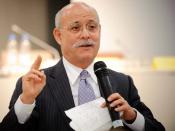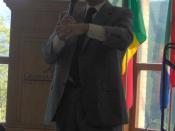Technology and the Future of Work
Every society creates an idealised image of the future - a vision that serves as a beacon to direct the imagination and energy of its people. The Ancient Jewish nation prayed for deliverance to a promised land of milk and honey. Later, Christian clerics held out the promise of eternal salvation in the heavenly kingdom. In the modern age, the idea of a future technological utopia has served as the guiding light of industrial society. For more than a century utopian dreamers and men and women of science and letters have looked for a future world where machines would replace human labour, creating a near workerless society of abundance and leisure.
(J Rifkin 1995 p.42)
This paper will consider developments in technology, robotics, electronic miniaturisation, digitisation and information technology with its social implications for human values and the future of work. It will argue that we have entered post modernity or post Fordism, a new age technological revolution, which profoundly effects social structure and values.
Some issues that will be addressed are: elimination of work in the traditional sense, longevity, early retirement, the elimination of cash, the restructuring of education, industry and a movement to global politics, economics and world government.
In particular this paper will suggest that the Christian Judao work ethic with society's goals of full employment in the traditional sense is no longer appropriate, necessary or even possible in the near future, and that the definition of work needs to be far more liberal. It argues that as a post market era approaches, that both government and society will need to recognise the effects of new technology on social structure and re-distribute resources, there will need to be rapid development of policies to assist appropriate social adjustments if extreme social unrest,
![Rosalie Jones' Army [Suffragettes] (LOC)](https://s.writework.com/uploads/17/172375/rosalie-jones-army-suffragettes-loc-thumb.jpg)

